-
 Bitcoin
Bitcoin $117500
2.15% -
 Ethereum
Ethereum $3911
6.19% -
 XRP
XRP $3.316
10.79% -
 Tether USDt
Tether USDt $1.000
0.01% -
 BNB
BNB $787.2
2.24% -
 Solana
Solana $175.2
4.15% -
 USDC
USDC $0.9999
0.00% -
 Dogecoin
Dogecoin $0.2225
8.40% -
 TRON
TRON $0.3383
0.28% -
 Cardano
Cardano $0.7868
6.02% -
 Stellar
Stellar $0.4382
9.34% -
 Hyperliquid
Hyperliquid $40.92
7.56% -
 Sui
Sui $3.764
7.63% -
 Chainlink
Chainlink $18.48
10.66% -
 Bitcoin Cash
Bitcoin Cash $582.1
1.88% -
 Hedera
Hedera $0.2601
6.30% -
 Avalanche
Avalanche $23.33
4.94% -
 Ethena USDe
Ethena USDe $1.001
0.02% -
 Litecoin
Litecoin $122.3
2.04% -
 UNUS SED LEO
UNUS SED LEO $8.969
-0.27% -
 Toncoin
Toncoin $3.339
0.86% -
 Shiba Inu
Shiba Inu $0.00001287
4.30% -
 Uniswap
Uniswap $10.43
7.38% -
 Polkadot
Polkadot $3.861
5.08% -
 Dai
Dai $1.000
0.02% -
 Bitget Token
Bitget Token $4.513
3.41% -
 Monero
Monero $267.7
-6.18% -
 Cronos
Cronos $0.1499
4.14% -
 Pepe
Pepe $0.00001110
5.15% -
 Aave
Aave $284.9
8.28%
How much does it cost to develop a supply chain management blockchain system?
Building a blockchain supply chain system costs vary wildly, from tens of thousands for basic systems to millions for complex enterprise solutions. Factors like features, team expertise, location, and chosen development approach (custom vs. pre-built) heavily influence the total cost, including ongoing maintenance.
Mar 22, 2025 at 03:00 pm
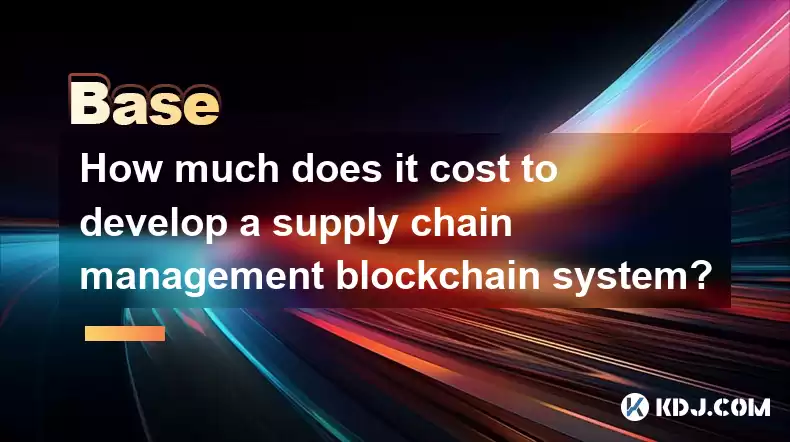
Key Points:
- The cost of developing a supply chain management blockchain system varies significantly depending on several factors.
- These factors include the complexity of the system, the features required, the development team's experience and location, and the ongoing maintenance costs.
- While a basic system might cost tens of thousands of dollars, complex, enterprise-grade solutions can easily exceed hundreds of thousands or even millions.
- Choosing the right development approach (custom development vs. using a pre-built platform) significantly impacts the total cost.
- Ongoing maintenance and updates should be factored into the overall budget.
How Much Does it Cost to Develop a Supply Chain Management Blockchain System?
Developing a blockchain-based supply chain management system is a significant undertaking. The cost isn't a fixed number but rather a range determined by many interconnected factors. Let's explore these factors in detail to understand the cost landscape better.
1. System Complexity and Features:
A simple system tracking basic product movement will naturally cost less than a complex system integrating multiple stakeholders, various data points (temperature, location, authenticity), and advanced analytics. Features like smart contracts for automated payments, sophisticated access control mechanisms, and integration with existing ERP systems all add to the development time and consequently, the cost. The more intricate the system's functionalities, the higher the development cost.
2. Development Team and Location:
The experience and location of the development team play a crucial role in determining the project's cost. A team of seasoned blockchain developers with expertise in supply chain management will command higher fees than a less experienced team. Geographical location also matters; developers in countries with higher labor costs will naturally charge more. Consider outsourcing vs. in-house development to manage costs.
3. Development Approach: Custom vs. Pre-built Platforms:
There are two primary approaches to developing a blockchain-based supply chain management system: custom development and using a pre-built platform. Custom development offers maximum flexibility and control but comes with a higher price tag. Pre-built platforms provide a faster, cheaper alternative, though they may lack the customization options of a custom-built solution. The choice depends on your specific needs and budget constraints.
4. Technology Stack:
The choice of blockchain platform (e.g., Ethereum, Hyperledger Fabric, Corda) significantly influences the development cost. Each platform has its own strengths and weaknesses, and the complexity of integrating with it will vary. Furthermore, the choice of programming languages, databases, and other technologies also impacts the overall cost.
5. Data Migration and Integration:
Integrating the new blockchain system with existing systems is a crucial step that often requires significant effort and expertise. Migrating existing data to the blockchain also adds to the cost, especially if the data is vast and needs to be cleaned and validated. This phase often involves data transformation and reconciliation processes.
6. Testing and Quality Assurance:
Thorough testing is essential to ensure the system's reliability and security. This includes unit testing, integration testing, and security audits. The cost of testing increases with the complexity of the system. Overlooking this crucial stage can lead to costly bugs and vulnerabilities down the line.
7. Ongoing Maintenance and Support:
After deployment, ongoing maintenance and support are essential to keep the system running smoothly and securely. This includes software updates, bug fixes, security patches, and ongoing monitoring. This ongoing cost should be factored into the overall budget. Consider the cost of technical support staff or ongoing service agreements.
8. Security Considerations:
Security is paramount in any blockchain system, especially one managing sensitive supply chain data. Implementing robust security measures, such as encryption and access control, adds to the development cost. Regular security audits and penetration testing are also necessary to identify and mitigate vulnerabilities. The more stringent the security requirements, the higher the cost.
Step-by-Step Breakdown of Development Process (Illustrative):
- Requirement Gathering & Analysis: Defining the scope, features, and functionalities of the system.
- Blockchain Platform Selection: Choosing the appropriate blockchain platform based on requirements.
- Smart Contract Development: Designing and developing smart contracts to automate processes.
- Frontend and Backend Development: Creating user interfaces and server-side logic.
- Database Design and Integration: Setting up and integrating databases for data storage.
- API Development: Building APIs for seamless integration with other systems.
- Testing and Quality Assurance: Rigorous testing to ensure system functionality and security.
- Deployment and Integration: Deploying the system and integrating it with existing infrastructure.
Cost Estimation Ranges:
A basic system might cost anywhere from $20,000 to $100,000, while a more complex enterprise-grade solution could easily cost upwards of $500,000 to several million dollars.
Frequently Asked Questions:
Q: What factors influence the cost the most? A: System complexity, features, development team experience, location, and the choice between custom development and pre-built platforms are major cost drivers.
Q: Can I get a fixed price quote? A: No, it's impossible to provide a fixed price without a detailed understanding of your specific requirements. The cost will vary significantly depending on your needs.
Q: Are there any cost-effective alternatives? A: Utilizing pre-built platforms or open-source solutions can offer cost savings compared to custom development. However, this may come at the expense of flexibility and customization.
Q: What about ongoing maintenance costs? A: Ongoing maintenance, including updates, security patches, and support, should be factored into your budget. These costs can vary significantly depending on the complexity of the system and the level of support required.
Q: What's the difference between using a pre-built platform and custom development? A: Pre-built platforms offer faster and potentially cheaper development, but limited customization. Custom development is more expensive but offers complete control and flexibility.
Disclaimer:info@kdj.com
The information provided is not trading advice. kdj.com does not assume any responsibility for any investments made based on the information provided in this article. Cryptocurrencies are highly volatile and it is highly recommended that you invest with caution after thorough research!
If you believe that the content used on this website infringes your copyright, please contact us immediately (info@kdj.com) and we will delete it promptly.
- XRP ETF, Bitcoin ETF, and Japan: A New Era for Crypto Investing?
- 2025-08-08 14:30:12
- Crypto, Congress, and Bills: Navigating the Regulatory Landscape in 2025
- 2025-08-08 14:30:12
- Union Jack Oil, Unused Gas, and Bitcoin: A New York Minute on UK's Crypto-Energy Play
- 2025-08-08 14:50:12
- Bitcoin Price: Bullish Flag Points to $123K Breakout?
- 2025-08-08 14:50:12
- Crypto Group's WNBA Dildo Toss: Meme Coin Mania or Just Plain Dumb?
- 2025-08-08 14:55:13
- Stablecoins, Hong Kong, and On-Chain Finance: Navigating the Regulatory Maze
- 2025-08-08 12:30:12
Related knowledge
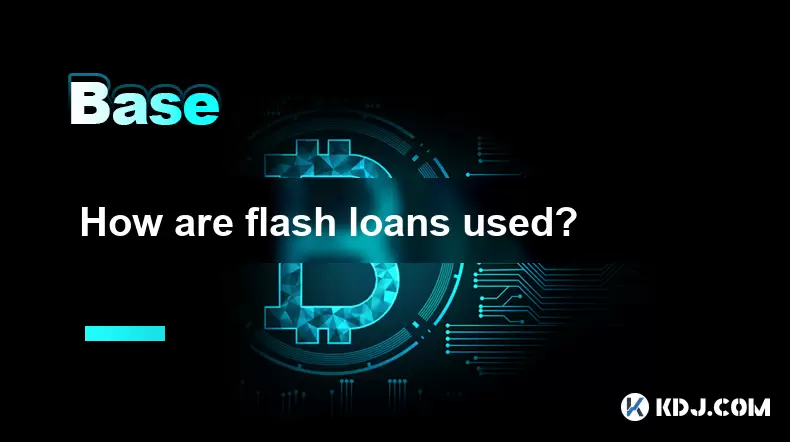
How are flash loans used?
Aug 08,2025 at 01:08pm
Understanding Flash Loans in Decentralized FinanceFlash loans are a unique innovation within the decentralized finance (DeFi) ecosystem, allowing user...
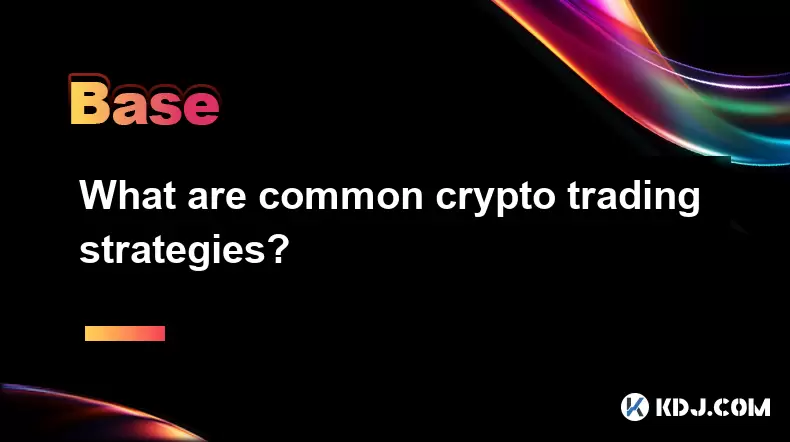
What are common crypto trading strategies?
Aug 08,2025 at 12:42pm
Understanding Trend Following in Crypto TradingTrend following is one of the most widely adopted crypto trading strategies due to its simplicity and a...
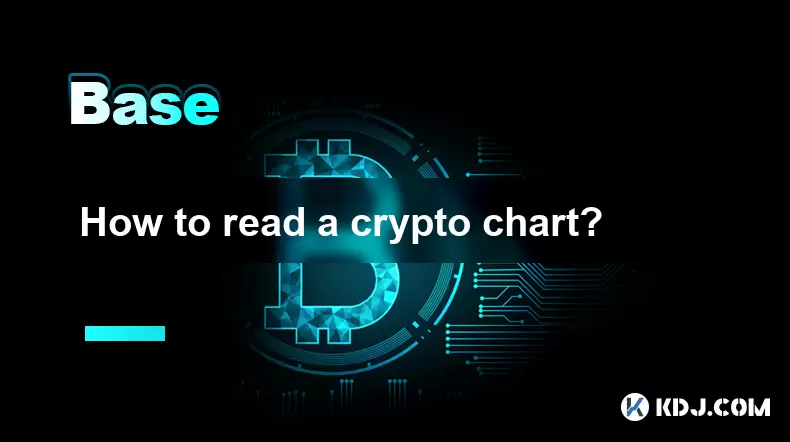
How to read a crypto chart?
Aug 08,2025 at 10:35am
Understanding the Basics of a Crypto ChartA crypto chart is a visual representation of the price movements of a cryptocurrency over time. These charts...
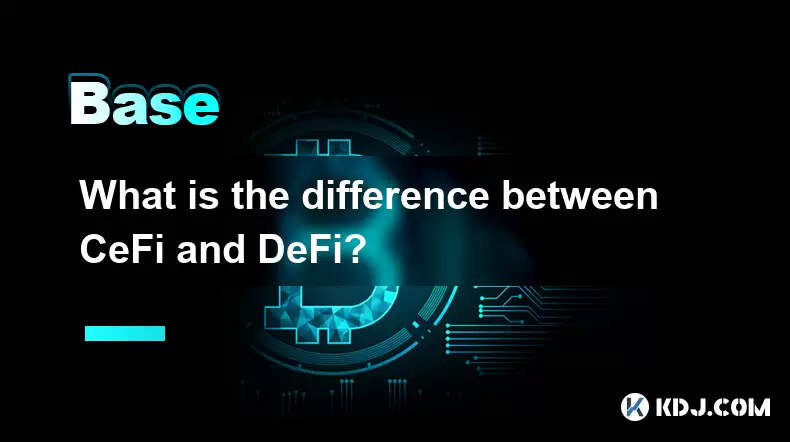
What is the difference between CeFi and DeFi?
Jul 22,2025 at 12:28am
Understanding CeFi and DeFiIn the world of cryptocurrency, CeFi (Centralized Finance) and DeFi (Decentralized Finance) represent two distinct financia...
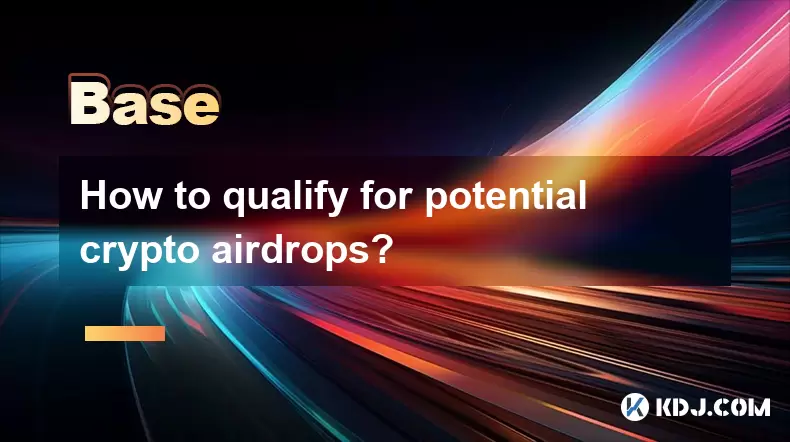
How to qualify for potential crypto airdrops?
Jul 23,2025 at 06:49am
Understanding What Crypto Airdrops AreCrypto airdrops refer to the distribution of free tokens or coins to a large number of wallet addresses, often u...
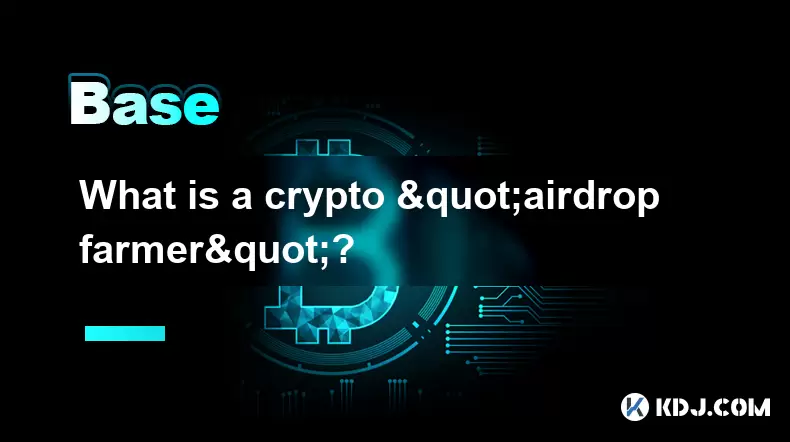
What is a crypto "airdrop farmer"?
Jul 24,2025 at 10:22pm
Understanding the Role of a Crypto 'Airdrop Farmer'A crypto 'airdrop farmer' refers to an individual who actively participates in cryptocurrency airdr...

How are flash loans used?
Aug 08,2025 at 01:08pm
Understanding Flash Loans in Decentralized FinanceFlash loans are a unique innovation within the decentralized finance (DeFi) ecosystem, allowing user...

What are common crypto trading strategies?
Aug 08,2025 at 12:42pm
Understanding Trend Following in Crypto TradingTrend following is one of the most widely adopted crypto trading strategies due to its simplicity and a...

How to read a crypto chart?
Aug 08,2025 at 10:35am
Understanding the Basics of a Crypto ChartA crypto chart is a visual representation of the price movements of a cryptocurrency over time. These charts...

What is the difference between CeFi and DeFi?
Jul 22,2025 at 12:28am
Understanding CeFi and DeFiIn the world of cryptocurrency, CeFi (Centralized Finance) and DeFi (Decentralized Finance) represent two distinct financia...

How to qualify for potential crypto airdrops?
Jul 23,2025 at 06:49am
Understanding What Crypto Airdrops AreCrypto airdrops refer to the distribution of free tokens or coins to a large number of wallet addresses, often u...

What is a crypto "airdrop farmer"?
Jul 24,2025 at 10:22pm
Understanding the Role of a Crypto 'Airdrop Farmer'A crypto 'airdrop farmer' refers to an individual who actively participates in cryptocurrency airdr...
See all articles

























































































